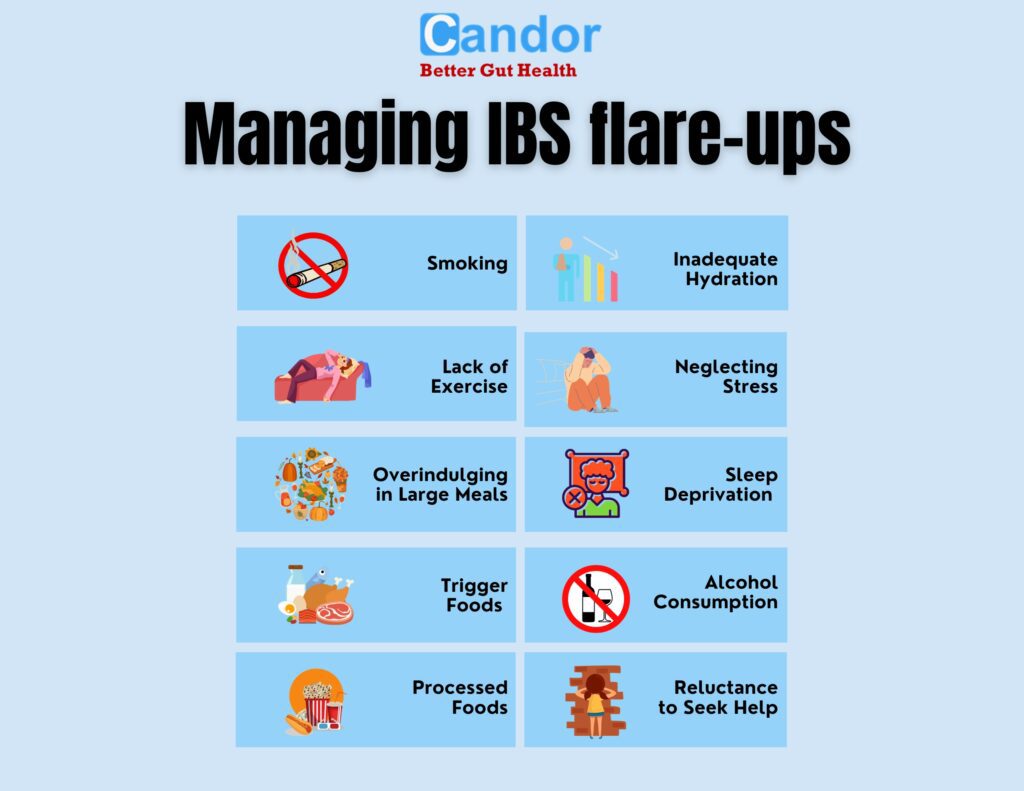
Understanding the factors that exacerbate your IBS can be challenging, especially during the initial phases of devising a treatment plan. This article guides you through some key considerations about managing IBS flare-ups.
1. Smoking
Cigarette smoke impacts not only the respiratory system but also the entire digestive tract. Inhaling smoke introduces irritants to the stomach and intestines, leading to bloating, cramping, gas, and stomach discomfort—clearly counterproductive for managing IBS symptoms.
2. Inadequate Hydration
A reliance on coffee and diet sodas throughout the day hampers optimal digestive function. Water is essential for overall well-being, aiding in preventing constipation and replenishing fluids lost during bouts of diarrhea.
3. Lack of Exercise
Devoting just 30 minutes a day to exercise significantly enhances overall health. The U.S. Department of Health and Human Services recommends 150 minutes of weekly exercise, providing benefits beyond stress reduction, potentially aiding in relieving constipation.
4. Neglecting Stress
While stress doesn’t cause IBS, it exacerbates symptoms. Effectively managing stress involves transforming it into a positive force, fostering creativity, and spurring constructive action. Allowing stress to linger adversely impacts digestive health, emphasizing the importance of stress management in coping with IBS.
5. Overindulging in Large Meals
Consuming three large meals a day isn’t optimal for digestive health. Instead, opting for five or six smaller meals ensures a steady supply of fuel, reducing the heavy feeling often experienced by those with IBS after larger meals.
Balancing irritable bowel syndrome (IBS) can be demanding, requiring significant lifestyle adjustments. To alleviate IBS symptoms, consider incorporating changes like modifying your diet to avoid triggers and embracing stress-relief practices. These adjustments can help sidestep potential challenges and potentially mitigate IBS flare-ups causing diarrhea or constipation.
6. Sleep Deprivation
Adequate sleep, ranging from seven to nine hours per night, is crucial for preventing IBS flare-ups. Improving sleep hygiene can enhance both the quantity and quality of sleep, contributing to better overall health.
7. Trigger Foods
Identifying trigger foods, such as fatty, fried, or carbonated options, is a personalized journey. Taking the time to pinpoint and avoid these triggers can significantly reduce the frequency of IBS flare-ups.
8. Alcohol Consumption
Reducing alcohol intake, especially for social drinkers, is essential. Alcohol disrupts the gastrointestinal tract, with beer causing gas and mixed drinks often containing other triggers. For some, abstaining from alcohol may be preferable to prevent IBS-related issues.
9. Processed Foods
Processed foods, laden with additives, can be harsh on the digestive system. Opting for fresh, whole foods with minimal ingredients is a prudent choice for individuals with or without diagnosed digestive conditions.
10. Reluctance to Seek Help
Support can come from various sources, including friends, family, coworkers, and healthcare professionals. Accepting assistance and valuable advice is encouraged to navigate an IBS-friendly diet and acquire effective stress-reduction techniques.
References:
- Biedermann L, Zeitz J, Mwinyi J, et al. (2013) “Smoking cessation induces profound changes in the composition of the intestinal microbiota in humans.” PLoS One.
- Cozma-Petruţ A, Loghin F, Miere D, Dumitraşcu DL. (2017) “Diet in irritable bowel syndrome: What to recommend, not what to forbid to patients!” World Journal of Gastroenterology.
- U.S. Department of Health and Human Services. Physical activity guidelines for Americans, 2nd edition.
- Qin HY, Cheng CW, Tang XD, Bian ZX. (2014) “Impact of psychological stress on irritable bowel syndrome.” World Journal of Gastroenterology.
- Irish LA, Kline CE, Gunn HE, Buysse DJ, Hall MH. (2015) “The role of sleep hygiene in promoting public health: A review of empirical evidence.” Sleep Medicine Reviews.
- Werlang ME, Palmer WC, Lacy BE. (2019) “Irritable bowel syndrome and dietary interventions.” Gastroenterology and Hepatology.



























